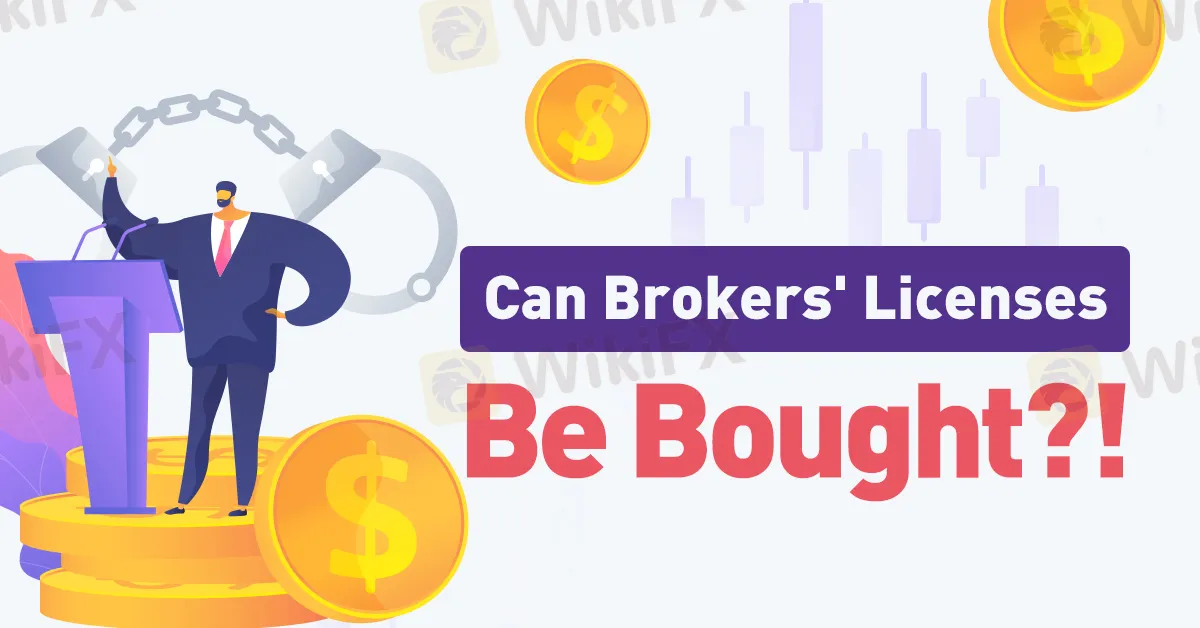简体中文
繁體中文
English
Pусский
日本語
ภาษาไทย
Tiếng Việt
Bahasa Indonesia
Español
हिन्दी
Filippiiniläinen
Français
Deutsch
Português
Türkçe
한국어
العربية
Can Brokers' Licenses Be Bought?!
Abstract:Exploring the intricate decision between acquiring an existing FX broker license and applying for a new one in the thriving world of FX brokerage, this article delves into the key factors that shape this pivotal choice.

The FX brokerage industry is lucrative for potential market entrants looking to establish themselves in key trading jurisdictions. When considering entry, a critical decision arises: acquiring an existing FX broker license or applying for a new one.
One drawback of pursuing a new license is the legal complexity, as noted by Amirani Azaladze, CEO of Forex Brokers License. Acquiring an existing permit, however, may not always be ideal. Azaladze points out that the transfer process and regulatory approval take as long as obtaining a new license, and the cost of an existing license is often significantly higher.
Establishing a new FX/CFD brokerage in many jurisdictions is becoming increasingly challenging due to stricter regulations. Chris Rowe, Director of Financial Technology Consultancy Services, suggests that the buy-or-apply decision should depend on the requirements for setting up a new licensed brokerage and the applicant's business model. He explains that existing regulated brokerages may be content to wait for the full application process. At the same time, those seeking to transition their client base may find a lengthy FCA application process unfavourable.

Emily Faye Helmer, Head of Partnerships at Clearsky Network, notes a significant increase in the time required to obtain a license due to enhanced Anti-Money Laundering (AML) policies. She highlights that in certain jurisdictions, regulators are reluctant to issue new licenses. Purchasers of existing licenses can complete ownership transfers in a more favourable 3-4 months.
Clearsky Network operates a marketplace that connects buyers and sellers in this sector, providing purchasers with essential information to take control of the acquired entity. However, it's vital to conduct due diligence on the existing license's financial reports, accounts, and clientele to ensure it is free from sanctions, fines, or debts.
Capital requirements vary based on the license type and jurisdiction. Azaladze notes that stringent regulators like CySEC, FCA, and ASIC impose higher requirements for STP, market makers, or additional services. Minimum capital can start at €135,000 for non-market maker brokers, while it varies in other jurisdictions.
While traders may prefer higher leverage, major jurisdictions offer lower leverage than offshore licenses. Still, holding licenses from ASIC, CySEC, or FCA carries significant prestige. Geographic location may influence the choice of license, with Southeast and Far East Asia favouring ASIC and FCA, the Middle East preferring CySEC, and offshore licenses like Mauritius, Seychelles, and Bahamas in demand. South Africa is also gaining popularity for targeting the African continent.
The difference between offshore and onshore jurisdictions lies in licensing frameworks, particularly AML and KYC requirements. Onshore jurisdictions like the EU, the UK, Australia, and Canada have more comprehensive AML and KYC requirements for ultimate beneficial owners.
Licensing costs vary widely. For instance, the FCA requires brokers to have a physical office in the UK, and acquisition costs can be substantial. ASIC licenses are expensive, while CySEC licenses are more economical. Offshore jurisdictions like Mauritius offer more affordable options, and South Africa is budget-friendly.
The FCA offers pre-application support for overseas firms expanding into the UK. Dr. George Theocharides, Chairman of CySEC, explains that those with valuable licenses may choose to sell them, triggering a rigorous process to ensure compliance with legal obligations.
In conclusion, acquiring an existing FX broker license and applying for a new one involves multifaceted considerations, from regulatory hurdles to financial commitments. Entities should tailor their decision to their specific circumstances and goals in the dynamic FX brokerage industry.

Disclaimer:
The views in this article only represent the author's personal views, and do not constitute investment advice on this platform. This platform does not guarantee the accuracy, completeness and timeliness of the information in the article, and will not be liable for any loss caused by the use of or reliance on the information in the article.
Read more

The Withdrawal Trap: How Scam Brokers Lure Victims into Paying More
In the world of online trading, the promise of quick profits and seamless transactions often masks a darker reality. One of the most insidious tactics employed by fraudulent brokers is blocking withdrawals, that is a deliberate strategy designed to trap traders and investors into paying more money under false pretences.

RM1.29 Million Lost in ‘C Baird VIP’ WhatsApp Scam
A 43-year-old company auditor and subcontractor in Malaysia became the latest victim of an elaborate investment scam after losing RM1.29 million to a fraudulent scheme promoted via WhatsApp.

Should You Beware of Forex Trading Gurus?
Know the reality behind forex trading gurus, examining their deceptive tactics, inflated promises, and the risks associated with trusting them for financial advice.

IG Group Acquires Freetrade for £160M to Expand UK Investment Market
IG Group acquires Freetrade for £160M, boosting its UK investment offerings. Freetrade to operate independently, with plans for growth and innovation.
WikiFX Broker
Latest News
FCA Warns Against 10 Unlicensed or Clone Firms
CySEC Warns Against 14 Unlicensed Investment Websites
Top Currency Pairs to Watch for Profit This Week - March 31, 2025
Will natural disasters have an impact on the forex market?
Philippines Deports 29 Indonesians Linked to Online Scam Syndicate in Manila
Exposing the Top 5 Scam Brokers of March 2025: A Closer Look by WikiFX
Gold Prices Climb Again – Have Investors Seized the Opportunity?
Webull Launches SMSF Investment Platform with Zero Fees
Australian Regulator Warns of Money Laundering and Fraud Risks in Crypto ATMs
The Withdrawal Trap: How Scam Brokers Lure Victims into Paying More
Currency Calculator







